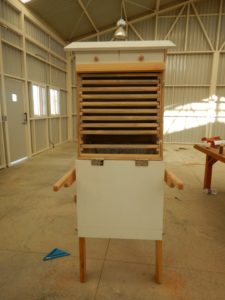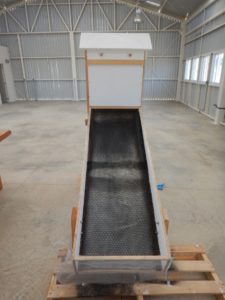 It arrived in pieces, along with the tools to build it. Carefully tucked in Hairik Honarchian bags was everything needed to finish a food-grade passive solar dehydrator that could processes up to 100 pounds of produce in a matter of days.
It arrived in pieces, along with the tools to build it. Carefully tucked in Hairik Honarchian bags was everything needed to finish a food-grade passive solar dehydrator that could processes up to 100 pounds of produce in a matter of days.
Honarchain, a Colorado State University student pursuing a Master of Agriculture degree, visited the CSU Todos Santos Center in Baja California Sur in October as part of a College of Agricultural Sciences course. The class, led by Department of Soil and Crop Sciences faculty Suellen Melzer and Addy Elliot, worked on several projects during the trip. The food dehydrator was Honarchain’s focus.
“It is a device that can help generate added value to the food products that are already being produced, and, thus, be helpful economically; it would reduce post-harvest food waste,” Honarchain said. “And it will do all these in an environmentally friendly manner. It is solely powered by sun, and, therefore, has a zero carbon footprint when being operated.”
Members of the Todos Santos community had identified food preservation as a chance to grow the market for local food producers. A local carpenter in Todos Santos helped cut 100 pieces of lumber on-site at the CSU Center to serve as the dehydrator’s structure. Fellow student Justin Tanner helped Honarchain complete the construction.
Giving the local community access to a dehydrator should help local growers, said Miguel Angel Leon Amador, of Todos Santos.
 “During the mango season, many mangoes go to waste,” Leon Amador said. “It would be great if they could learn how to dehydrate. It would also help those who have herbs in their houses because the market for herbs, especially dried, is a good economic option. Also learning how to dry fish or meat would be excellent.”
“During the mango season, many mangoes go to waste,” Leon Amador said. “It would be great if they could learn how to dehydrate. It would also help those who have herbs in their houses because the market for herbs, especially dried, is a good economic option. Also learning how to dry fish or meat would be excellent.”
Given the community request established in the Community Needs Assessment, completed in 2014, Honarchain hopes the device will have a positive impact in the community.
“I am, moreover, certain that the dehydrator will prove itself to be a valuable asset both for the local food producers, as wells as, for the US and Mexican students, who will visit the Center and learn about it and experiment with,” Honarchain said. “It is a device that can help generate added value to the food products that are already being produced, and, thus, be helpful economically; it would reduce post-harvest food waste.”